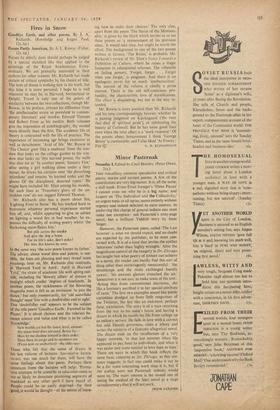Minor Pasternak
THIS miscellany contains speculative and critical pieces, stories and earliest poems. A few of the contributors are very big names. It is, all the same, a dull book. From Ernst Juenger's 'Three Pieces' I cannot even see why he is a big name; and Jaspers on 'The Individual and the Collectivity,' an urgent topic as all agree, seems entirely without urgency and indeed deficient in mere interest. In preferring this charge of general tedium one must make one exception : not Pasternak's sixty-page novel, but a brilliant Yiddish story by Isaac Singer.
However, the Pasternak piece, called 'The Last Summer' is what we should expect, and no doubt are expected by the publisher, to be most con- cerned with. It is of a kind that invites the epithet 'laborious' rather than 'hig'hly wrought.' After the magnificent control of the imagery in Dr. Zhirago has taught him what poetry of texture can achieve in a novel, the reader can hardly find this sort of thing other than extravagantly unsuccessful : 'the streetlamps and the mists exchanged beastly yawns'; 'his anxious glances crunched the air.' Sometimes it is not easy to make sense of the text : 'Acting thus from conventional discretion, she like a luminary ascribed it to her special attribute of caste.' The first two examples sound like poetic curiosities dredged up from little magazines of the Twenties, the last like an awkward, perhaps false, translation. The story is of a man returning from the war to his sister's house and having a dream in which he recalls his life from college up to military service:He falls in love with a correct but odd Danish. governess,. visits a whore and writes the scenario of a fantastic allegorical novel. The dream ends on the recollection of a very happy moment, 'in that last summer when life appeared to pay heed to individuals, and when it was easier and more natural to love than to hate.° There are ways in which this book reflects the same basic,concerns as Dr. Zhirago, as this sen- tence suggests; in fact one could make it out to be a far more interesting work than it is, bet if the author were not Pasternak nobody. would want to, The main interest is the muted one of seeing the method of the later, novel at a stage so rudimentary that it will not work. • FRANK KERMODE










































 Previous page
Previous page